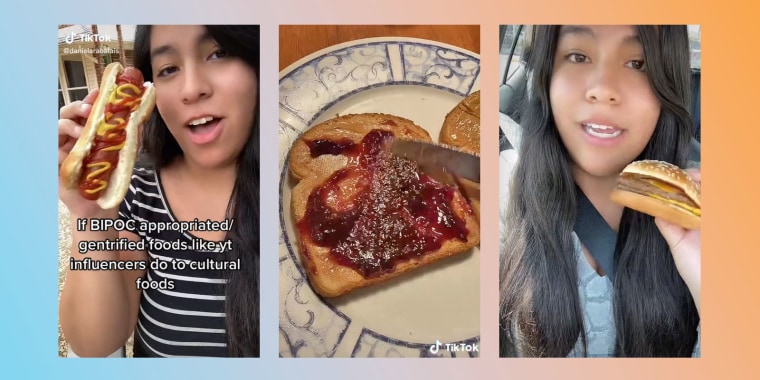What do you call a sausage stuffed in a "fluffy tortilla" and coated with an American "crema"?
TikTok creator Daniela Rabalais calls it a "sausage taco." Although, to everyone else, it's likely to be better known as a hot dog.
This week, Rabalais, who is Mexican American, went viral on TikTok for showcasing her creation. But she wasn't trying to make and share a "new" recipe. She instead uses her TikTok account to parody how some culinary creators appropriate traditional foods from Black, Indigenous and Latino communities.
Her video, which shows viewers how she came up with “sausage tacos,” has racked up more than 2.8 million views since it was posted on July 22. The caption reads, “If BIPOC [Black, Indigenous and people of color] appropriated foods like [white] people do to our cultural foods.”
She used the hashtag #culturalappropriation in her caption. But what she's drawing attention to is what many have described as culinary appropriation, which refers to when white people take culinary ideas, like cuisines and recipes, from minority or marginalized groups and rebrand them under new names.
The accusations of culinary appropriation have become more publicized thanks to TikTok, where people often criticize white creators for appropriating dishes.
Take the TikTok trend "spa water," for example, which Rabalais said inspired her make the "sausage taco" parody.
“Spa water,” which is a blended fruit drink, is actually a well-known Mexican beverage called “agua fresca,” according to Rabalais and other creators.
“When I saw them, I originally thought they were a joke,” Rabalais said of the videos featuring spa water. “I looked them up myself and found they were not a joke.”
The spa water controversy spilled over to Twitter, where some users followed Rabalais’ lead in joking about the trend of whitewashing foods from other cultures.
“omg i can’t be the only one obsessed with hispanic hot pockets and rice cinnamon [lattes] like they taste so good,” a person tweeted alongside an image of tamales and horchata.
Others have also faced backlash for alleged culinary appropriation in the past.
Last year, a white food blogger was criticized for mislabeling a noodle dish as the Vietnamese noodle dish pho.
Another white woman, who started her own breakfast company, called herself the “queen of congee,” a more than 4,000-year-old Asian rice porridge. She was criticized for saying she had "improved" the dish.
Trader Joe’s has also been accused of appropriating traditional foods. In 2020, it famously said no to changing racist label names like “Trader Ming” and “Trader José,” which it used to market packaged Asian and Mexican foods.
“We want to be clear: we disagree that any of these labels are racist,” the company said in a statement on its website. It recanted a few weeks later and agreed to change the names after a petition gathered thousands of signatures.
Rabalais said she was once bullied for enjoying traditional Mexican dishes like elote at school.
"To see that now be everyone's favorite thing in a Mexican restaurant ... it is frustrating," she said.
Still, she encourages everyone to try cuisine from around the world — as long as they're learning about the origins of the meals they're eating.
"Just give credit where credit is due," she said. "And don't try and pass off a watered-down version of a cultural dish as your own to then capitalize on it."

